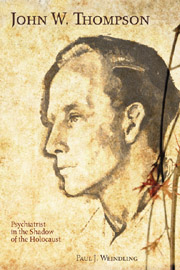Book contents
- Frontmatter
- Contents
- List of Illustrations
- Acknowledgments
- List of Abbreviations
- Part One Into the Dark
- Part Two Redemption
- Part Three Aftermath
- 13 UNESCO: At the Conscience of the World
- 14 The Eau Vive Affair
- 15 Sebastian
- 16 Matthias
- 17 Child Guide
- 18 New York: “St. John the Psychiatrist”
- 19 Hallucinations
- 20 “Dying We Live”
- Appendix John Thompson's Writings
- Notes
- Sources
- Index
17 - Child Guide
from Part Three - Aftermath
Published online by Cambridge University Press: 12 September 2012
- Frontmatter
- Contents
- List of Illustrations
- Acknowledgments
- List of Abbreviations
- Part One Into the Dark
- Part Two Redemption
- Part Three Aftermath
- 13 UNESCO: At the Conscience of the World
- 14 The Eau Vive Affair
- 15 Sebastian
- 16 Matthias
- 17 Child Guide
- 18 New York: “St. John the Psychiatrist”
- 19 Hallucinations
- 20 “Dying We Live”
- Appendix John Thompson's Writings
- Notes
- Sources
- Index
Summary
Visionary Fish
When Thompson arrived in Oxford, he introduced an aquarium at the Child Guidance Clinic. Thompson meant this microcosmic marine world to fascinate children and calm their anxieties. The educational psychologist was John Fish.
The tank evoked deeper currents. It was a memento of Eau Vive as living water, reminding Thompson of the active Christian life and symbolizing his peripatetic path from marine biology to becoming “a fisher of men.” Jung had recently had a vision of an eerie laboratory, interpreting Christ as a fish, and God the father as a wounded Fisher King: “The fish laboratory is a synonym for the ecclesiastical ‘care of souls.’” This marked the coming of the Age of the Fishes.
There were ripples of the Holocaust: Primo Levi had felt himself gazed at “as if across the glass window of an aquarium between two beings who live in two different worlds.” Understanding the gaze would offer insight into “the great insanity” of Third Reich Germany, which still haunted Thompson. But Thompson's belief in the essential community of all living beings-between humans and animals, religions and cultures, children and adults—meant that one should aspire to communion between the two sides of the dividing glass. The child psychiatrist could relieve distress and provide direction.
Of course, the children saw only darting, shimmering fish. The child possessed innate wisdom. Thompson pondered the question Who is well educated? He felt that each person had to live creatively with his or her own shortcomings and he regarded “standard education” as anathema.
Information
- Type
- Chapter
- Information
- John W. ThompsonPsychiatrist in the Shadow of the Holocaust, pp. 265 - 281Publisher: Boydell & BrewerPrint publication year: 2010
